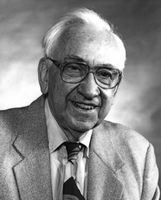Herbert V. Guenther
| PersonType | Category:Authors of English Works Category:Professors |
|---|---|
| FirstName / namefirst | Herbert |
| LastName / namelast | Guenther |
| namemiddle | Vighnāntaka |
| MainNamePhon | Herbert V. Guenther |
| SortName | Guenther, Herbert |
| bio | Dr. Herbert Guenther (1917-2006) was one of the first translators of the Vajrayana and Dzogchen teachings into English. He was well known for his pioneering translations of Gampopa's Jewel Ornament of Liberation and Longchenpa's ངལ་གསོ་སྐོར་གསུམ་, ngal gso skor sgum, which was published as a trilogy under the title Kindly Bent to Ease Us.
He was born in Bremen, Germany, in 1917. He studied in Munich and Vienna, and then taught at Vienna University from 1943 to 1950. He then lived and taught in India, at Lucknow University from 1950 to 1958, and the Sanskrit University in Varanasi from 1958 to 1963. He then went to the University of Saskatchewan in Canada, where his students included Leslie Kawamura, Kennard Lipman, Steven Goodman and James Valby. According to Steven Goodman, Guenther used to say that a good translator must do two things: 1) translate Tibetan terms based on the genre and approach in which they are being used, and 2) continually refine one's translation choices. Guenther had many admirers and although many of his translation choices never caught on, his work did have a clear and undeniable influence on many translators. (Source Accessed July 22, 2020) Also see Steven Goodman's article "Death of a Pioneer". See a list of terms used by Guenther in translation on Rigpa Wiki here. Herbert V. Günther on Wikipedia QUOTES: ~ "Bodhisattva - The Ethical Phase in Evolution" in The Bodhisattva Doctrine in Buddhism, page 123, note 1. |
| YearBirth | 1917/03/17 |
| YearDeath | 2006/03/11 |
| IsInGyatsa | No |
| Other wikis |
If the page does not yet exist on the remote wiki, you can paste the tag |
Template:DRL Authors of German Works

